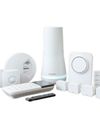As Joey Fortuna found out, it doesn’t matter how educational a toy is if kids don’t want to play with it.

“STEM toys” are meant to encourage children to develop their skills in the key disciplines of science, technology, engineering, and mathematics, and consumers see more of them every time they shop for their kids. As toys marketed with the STEM buzzword proliferate, parents wonder whether they really deliver on their promises. Can a toy that teaches coding really create a computer genius? Can a robotics toy inspire a future scientist who will change the world—or, at least, make a really good living? Or are STEM toys just marketing hype? In talking to experts, we didn’t uncover any stats about the long-term efficacy of these toys—the field is just too new—but we did learn about the standards, rigor, and testing that go into creating them.
Fortuna is a programmer and the CTO of j2 Global (PCMag’s parent company), and he’s given his two children, ages 8 and 10, multiple STEM toys over the years. He’s observed that some toys with educational ambitions have simply bored his kids. Take Modular Robotics Cubelets, which let you create robotics projects using magnetically connectable cubes. “The idea is that you … string together a bunch of cubes in a different configuration, and you have something that can move and detect obstacles or make sounds,” Fortuna says. “In reality, the range of things you can do with it is so limited, the conceptual hurdle to get to the point where you coax any sort of convincing or interesting behavior out of it is so large, that they quickly lost interest.”
This story is from the June 2019 edition of PC Magazine.
Start your 7-day Magzter GOLD free trial to access thousands of curated premium stories, and 9,000+ magazines and newspapers.
Already a subscriber ? Sign In
This story is from the June 2019 edition of PC Magazine.
Start your 7-day Magzter GOLD free trial to access thousands of curated premium stories, and 9,000+ magazines and newspapers.
Already a subscriber? Sign In

AUDIO
AUDIO

SMART HOME
SMART HOME

T Mobile
Mobile

Lenovo Legion 5 Pro Gen 7 (2022): Nearly an Editors' Choice
A solid gaming laptop for under 2,000

Apple TV 4K 3rd Generation): Best for the Apple-Centric
A powerful, feature-rich media streamer that’s pricier than most

20 Tips for Leveling Up Your Work-at-Home Game
Whether you're new to working remotely or just looking fo do if beffer, fhese fips can help you stay productive and maintain balance.

12 Google Calendar Tricks You're Probably Not Using
Wondering how to share your Google Calendar? Want to add a new calendar? Here are the tips you need.

SimpliSafe Home Security System: Affordable Ease of Use
Affordable security with a focus on flexibility

Honda Unveils First All-Electric SUV, Built on GM's Battery Platform
The Honda Prologue battery-electric SUV arrives in 2024 and will use the Ultium battery technology developed by General Motors.

We Must Save Streaming Video Before It’s Too Late
A generation of art risks extinction if the companies that own streaming services don’t believe their vast libraries are worth preserving. We have to act now to save it.